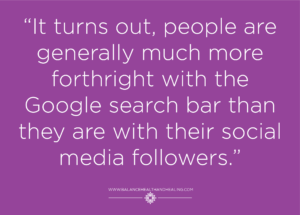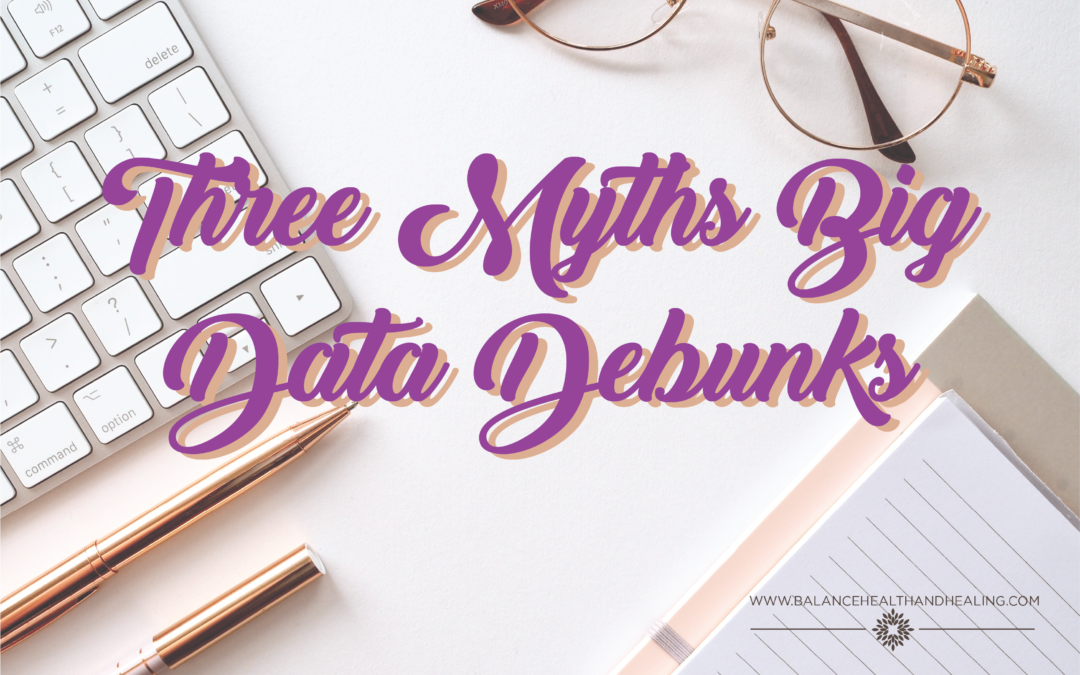Often, clients feel that they’re uniquely distressed, socially awkward, or “messed up.” Everyone else seems to have their lives together. Facebook and Instagram confirm their intuitions. Their peers are getting happily married, having beautiful families, landing dream jobs, and earning advanced degrees. Moreover, those peers seem to do it all smiling, with effortless glee and levity.
 I’ve lost count of how many times I’ve heard a client say: “I feel like I’m the only person who has this problem. Why can’t I figure it out when everyone else can?” Big data researchers, scientists who use the incredible quantities of data on the internet to make inferences about human behavior, have identified a phenomenon that might partially explain this trend. It turns out, people are generally much more forthright with the Google search bar than they are with their social media followers. In other words, there are massive discrepancies between the content that people Google and the content they create on Instagram. In this blog post, I will review a few of these findings that pertain to the pervasive feeling that we are uniquely messed up.
I’ve lost count of how many times I’ve heard a client say: “I feel like I’m the only person who has this problem. Why can’t I figure it out when everyone else can?” Big data researchers, scientists who use the incredible quantities of data on the internet to make inferences about human behavior, have identified a phenomenon that might partially explain this trend. It turns out, people are generally much more forthright with the Google search bar than they are with their social media followers. In other words, there are massive discrepancies between the content that people Google and the content they create on Instagram. In this blog post, I will review a few of these findings that pertain to the pervasive feeling that we are uniquely messed up.
Myth 1: Everyone Else Has a Great Relationship
The most common words people use to describe their significant others on social media are “best,” “good,” and “beautiful.” The most common questions people search about their significant others on Google? “Why am I unhappy in my marriage?” “Is my partner cheating?” “Does my partner love me?” And researchers are able to identify that the people praising their significant others on social media are the same people airing their insecurities to the search engine.
As Jim Gaffigan said, “I’m not a calculus teacher, but I’m pretty sure everyone’s lying.” Relationships, as all can attest, are messy, difficult, often painful-but-worth-it endeavors. And perhaps most people aren’t lying about their relationships but simply hiding the challenging parts. The unfortunate consequence of this mass concealment is that it makes it all too easy to feel alone in the struggle.
Myth 2: Other People Have Lots of Close Friends
Recent evidence suggests that people now have fewer close friendships than at any other point in recorded history. This trend is more pronounced among young people in developed countries, including America. But you probably wouldn’t think this based on a review of people’s social media feeds. A cursory scroll through Instagram or Facebook reveals dozens of photos of people at gatherings and parties, enjoying outdoor adventure culinary fineries. People seem to live inside an American Eagle photo shoot. When pressed, however, in anonymous surveys about their social lives, many of these same people report feeling sad due to loneliness and having few friends with whom they would feel comfortable sharing personal information. We’re in, as some have called it, an epidemic of loneliness, one made all the more acute by the mistaken perception that one is alone in the loneliness.
countries, including America. But you probably wouldn’t think this based on a review of people’s social media feeds. A cursory scroll through Instagram or Facebook reveals dozens of photos of people at gatherings and parties, enjoying outdoor adventure culinary fineries. People seem to live inside an American Eagle photo shoot. When pressed, however, in anonymous surveys about their social lives, many of these same people report feeling sad due to loneliness and having few friends with whom they would feel comfortable sharing personal information. We’re in, as some have called it, an epidemic of loneliness, one made all the more acute by the mistaken perception that one is alone in the loneliness.
Myth 3: Other People are More Normal, Moral, and Secure
Cognitive therapists often cite a “cognitive triad” that occurs in depressed clients. This refers to the tendency for depressed people to view themselves, the world, and the future negatively: “I am bad, the world is bad, and things will always be this way.” Often, when people struggle with depressive and anxious symptoms, they see themselves and their prospects in this distorted way. They assume they’re worse than others–less smart, worse looking, more sinful.
But the fact is, most people are pretty weird, at least if their Google search history is any indicator. The search engine reveals strange fetishes and fears. People keep sexual secrets, of course, but not just sexual secrets. Seth Stevens-Davidowitz, author of Everybody Lies: Big Data, New Data, and What the Internet Can Tell Us About Who We Really Are, notes that body dissatisfaction is highly common, even for men. Prejudice against other races and against girls and women are also very common, even in liberal states and cities. The data online would suggest normalcy doesn’t really exist and that no one is all good or all bad. What’s more, just about everyone, even your most confident counterparts, hide deep insecurities about their appearance, performance, sexuality, children, integrity, and beliefs.
Conclusion
 There’s an abundance of books and articles (some published on this blog) denouncing the habit of comparison. And that’s a good thing. Injunctions to avoid this habit date back, at the latest, to the 10 Commandments. In 1931, Bertrand Russell called the habit of comparison “a fatal one.” Still, humans have a biological propensity to compare ourselves to others. In an age with quick and heavily curated access not only to our friends’ lives but to the lives of celebrities, this propensity becomes more pernicious. What could be a source of connection–our shared struggle and strangeness–becomes a source of shame. Big data shows us that we’re more similar than it seems on the surface.
There’s an abundance of books and articles (some published on this blog) denouncing the habit of comparison. And that’s a good thing. Injunctions to avoid this habit date back, at the latest, to the 10 Commandments. In 1931, Bertrand Russell called the habit of comparison “a fatal one.” Still, humans have a biological propensity to compare ourselves to others. In an age with quick and heavily curated access not only to our friends’ lives but to the lives of celebrities, this propensity becomes more pernicious. What could be a source of connection–our shared struggle and strangeness–becomes a source of shame. Big data shows us that we’re more similar than it seems on the surface.
“True humility,” as Uncle Iroh put it, might be “the only antidote to shame.” And here I refer to humility as a species, an acknowledgement that to be human is to be somewhat whacky, a mixture of mistakes and victories. The poet Lauren Ireland wrote that “almost everyone is lonely, almost no one’s amazing.” Although this might sound pessimistic, I believe it’s an ode to the vastness of what we share. A host of clinical experiences has convinced me that dragging this shame into the light, whether with a therapist or some other trusted person or group, detoxifies it beyond expectations. The lies we tell ourselves grow weaker the more clearly we see them.

